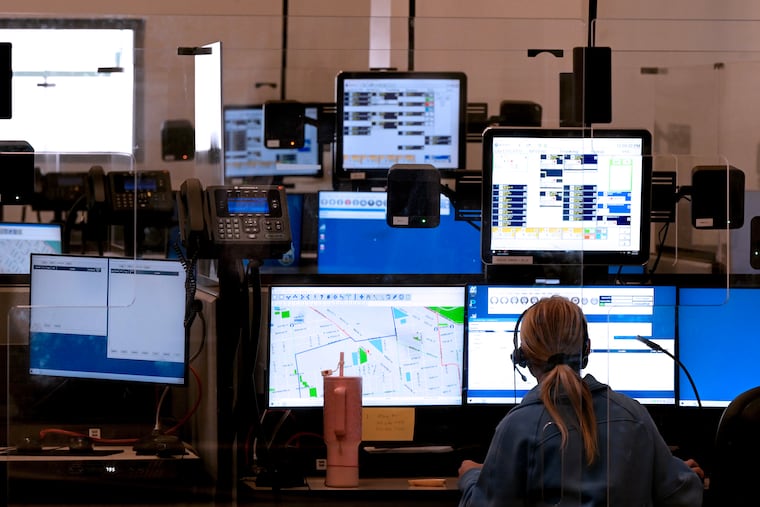Philly 911 dispatchers are getting raises as staffing issues continue to plague the radio room
The staffing situation has slightly improved but has not abated. Police officials said Thursday there are about 60 vacancies in the room.

Philadelphia’s 911 call takers are getting across-the-board 10% raises and new opportunities for advancement as city officials try to make the job more attractive amid a years-long crisis of understaffing.
Police Commissioner Kevin J. Bethel and City Councilmember Jamie Gauthier announced the changes Thursday — including pay in line with the regional average and a new path to becoming supervisors — which aim to boost morale among the city’s 300 dispatchers.
Supervisors in the radio room have long been police officers who went to the academy, meaning that call takers couldn’t be promoted. Now, the supervisors will be a mix of sworn and civilian personnel. Bethel said it was “unacceptable” that dispatchers previously had no way to advance.
“What they endure is substantial,” he said. “They are the epicenter of the activity that we do here.”
The pay increase — a 5% raise atop a 5% raise that’s contractually obligated through the dispatchers’ union — was one of the results of a City Council probe led by Gauthier. She called for hearings last year after police botched the response to a homicide in her Southwest Philadelphia district, sending officers to the wrong location of a crime scene.
» READ MORE: Philly Police made changes after botching a 911 response, but the radio room remains in crisis
In July 2023, police received a 911 call about a shooting on the 1600 block of 56th Street. Officers were sent to North 56th Street instead of the actual crime scene on South 56th, where Joseph Wamah had been killed. His body was not discovered until two days later after the same gunman allegedly returned to the street and shot six more people, killing four of them.
Police brass testified during the Council hearing last fall that they’d made changes to the scripts that call takers use to guide phone conversations and that dispatchers now ask more details about directional indicators.
But call takers said the problems in the radio room ran deeper. They described severe understaffing, mandatory overtime, and plummeting morale that made retention especially challenging. At the time, the city said more than 300 call-takers had left the job over the course of three years.
The staffing situation has slightly improved but has not abated. Police officials said Thursday that there are about 300 employees in the radio room, which is budgeted to have about 360 — a 16% vacancy rate. Bethel said that the department is aggressively recruiting new employees, and that the pay increase should help.
Before the raise, Philadelphia Police dispatchers made a minimum of $42,000 a year, which officials said was 10% less than the average minimum pay among dispatchers at other agencies in Philadelphia and the collar counties.
A wage increase and a chance to advance was a key priority for workers and should improve retention, said Gordon Zimmitt, president of AFSCME District Council 33 Local 1637, the union that represents 911 dispatchers. He described the changes as “small tokens of our appreciation.”
“911 operators are the first first responders,” Zimmitt said. “We want to thank them. Not often — hardly ever — are they thanked by our citizens. No one calls 911 to say thank you.”